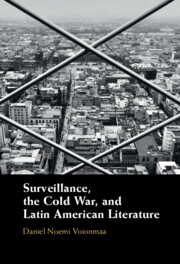Book contents
- Surveillance, the Cold War, and Latin American Literature
- Surveillance, the Cold War, and Latin American Literature
- Copyright page
- Dedication
- Contents
- Figures
- Preface
- Acknowledgments
- Chapter 1 Seeing It All
- Chapter 2 Latin American Archives and Human Matter
- Chapter 3 Cultural Cold War
- Chapter 4 Spying and Knowledge
- Chapter 5 Reading Like a Spy
- Chapter 6 Writing Like a Spy
- Chapter 7 Spying Like a Writer
- Conclusion
- Notes
- Bibliography
- Index
Chapter 6 - Writing Like a Spy
Intelligence Services in Guatemala and Mexico
Published online by Cambridge University Press: 18 August 2022
- Surveillance, the Cold War, and Latin American Literature
- Surveillance, the Cold War, and Latin American Literature
- Copyright page
- Dedication
- Contents
- Figures
- Preface
- Acknowledgments
- Chapter 1 Seeing It All
- Chapter 2 Latin American Archives and Human Matter
- Chapter 3 Cultural Cold War
- Chapter 4 Spying and Knowledge
- Chapter 5 Reading Like a Spy
- Chapter 6 Writing Like a Spy
- Chapter 7 Spying Like a Writer
- Conclusion
- Notes
- Bibliography
- Index
Summary
Chapter 6 opens with examination of several reports by informants and agents in the Guatemalan National Police Archive. It discusses the language used and its implications. Then it analyzes the file of president Jacobo Árbenz from YEARS. Next, it studies the over 2,500 pages of José Revueltas’ file found in the Archive of the DFS. Most of the documents refer to Revueltas’ trial after the events of 1968. The chapter discusses the language employed by the agents, how Revueltas’s “responsibility” for the events of 1968 was established, and how surveillance of Revueltas did not end until his death. Subsequently, the chapter scrutinizes the files of Gabriel García Márquez. These files show the ambiguous position held by García Márquez in Mexico—he was described as “guest of honor” and “KGB agent” simultaneously. It discusses the writer’s political views and his silence regarding Mexican state violence.
Keywords
- Type
- Chapter
- Information
- Surveillance, the Cold War, and Latin American Literature , pp. 121 - 145Publisher: Cambridge University PressPrint publication year: 2022

